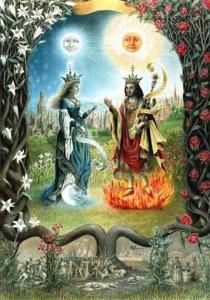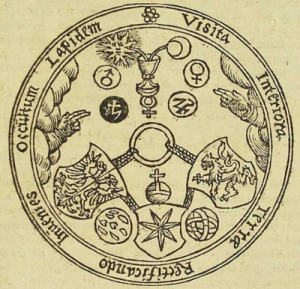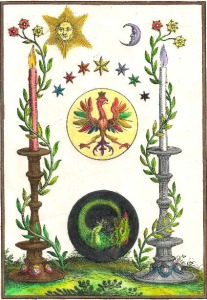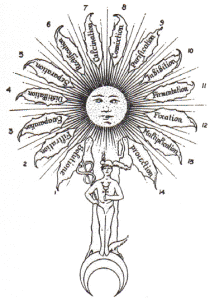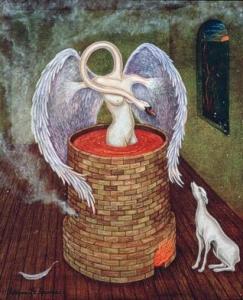
Alchemical Explorations with Thomas Elsner
Beth Anne Boardman, Ph.D. (Mythological Studies, 2012) | originally posted 29 Jan 2013
You know, Jung had a collaboration with Wolfgang Pauli, the Nobel prize-winning physicist, and they talked about this relationship between Depth Psychology and physics, Quantum Physics, for 26 years! It’s amazing! I mean, Pauli was one of the discoverers of Quantum Theory. And Jung’s book Psychology and Alchemy, which was his first big book on alchemy, was a collection of a couple of hundred dreams — these were all Wolfgang Pauli’s dreams. Most people don’t know that. So Jung was amazed at how the dreams of a modern physicist, a very creative modern physicist, brought up all the alchemical symbolism, that Pauli’s unconscious was constellated like that.
•|•
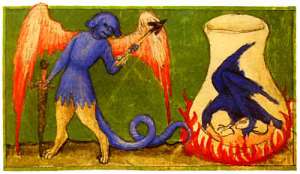
On a recent windswept winter afternoon in Goleta, California, between storm systems, mealtimes, and the ending of one year and the beginning of the next, I spent a generous hour listening to Thomas Elsner’s sparkling, enthusiastic exploration of the topic of alchemy. Alchemy, The Red Book, and the New Myth of Our Time, Elsner’s four-month, one-weekend-a-month public program, just got underway at Pacifica’s Ladera Lane campus this past weekend.
Based in the Counseling Psychology program at Pacifica, Elsner also teaches in the Depth Psychotherapy and Depth Psychology programs.
BAB | We’ve been talking about thinking symbolically or metaphorically. Is this something you’re going to touch on in the alchemy workshop during the coming months?
TE | The way into alchemy has to be through metaphor or symbol, because if you take the alchemical language literally, it’s the same as psychotic language — it’s a crazy language! So the way into it is through seeing alchemy as poetry or as metaphor or as symbol. Then you can think about what those metaphors or symbols mean psychologically, and the whole thing becomes comprehensible, which is exactly what Jung did.
In our culture, I think it’s super important for the survival of our whole species that more and more people begin to be able to develop a metaphoric or symbolic sensibility. Because, on the one hand we have religious fundamentalism, which is a huge problem in our world, where people will literally kill you if you don’t believe their truth and their images of God. Or, their archetypal images (we would say from the depth psychological point of view) are considered to be literally true, and others are false. And on the other hand you have the cynical-rationalists, who debunk all of that sort of religious thinking as delusion, and dangerous delusion. So the depth psychological alternative is a kind of middle ground of thinking of religious reality as not literally true, and not as delusions, but as symbols for psychic realities.
BAB | How did you come to the study of alchemy?
TE | I still can’t believe that I’m the guy at Pacifica who teaches alchemy, because I was a lawyer, and then I was just very conventionally trained in everything. So the interest for me was never academic or scholarly or intellectual, or kind of as an “interest.” It was because through my own dreams and my own therapy I noticed that symbols in my dreams, which seemed incomprehensible but really important, appeared in the alchemy texts and the imagery from alchemy.
What got me ignited and interested in alchemy in the first place was opening up an alchemy book, seeing the images, and saying, “There’s my dream!” Or reading something in an alchemical text: “Oh my God, that’s my dream!” The imagery I’m talking about isn’t conventional, it’s not Christian imagery or conventional religious imagery, and I had no connection to it at all.
This is exactly what got Jung interested in alchemy, too. When he discovered the alchemists, he said, in effect, “Here’s another Red Book. Alchemy is another Red Book!” — The Red Book being Jung’s description of his encounter with the unconscious, his active imagination dialogues, and the artistic paintings he did, which were strange and bizarre to him. He didn’t know there was anyone else in the entire world who had ever done such a thing, who had encountered these types of images. When he discovered alchemy, he found that here was a bunch of other people [who] had opened up these same layers of the psyche and described them in ways really similar to the ways that he had.
BAB | It seems to me that the symbols of alchemy have so much to offer the culture as a whole.
TE | [Marie-Louise] Von Franz, for instance — in an interview, someone asked her, “What was the main importance of Jung’s work on alchemy for you?” And she said that, basically, every culture needs a myth to survive, and in our culture the Christian myth for many people doesn’t function any more as a living myth. In many cultures, if their myth dies — their guiding story — the people die, or they disintegrate, or they lose meaning. She [thought] that alchemy could be the new myth for our culture because it brings back what was missing in the traditional mythology, namely the encounter with the feminine, the confrontation with evil, and a new relationship between psyche and matter — matter as something alive, not something just dead that obeys mechanical rules. Von Franz even said that if our culture has the chance for survival, it will be by accepting the alchemical myth.
BAB | Would you say the Christian myth works at all as an example of alchemical transformation?
TE | The main idea in The Red Book is this transition from, in the Christian mythology, worshipping Christ as the God-man to the sense that Jung realizes he has to sacrifice the hero myth, and that means also sacrificing the idea of a savior outside of himself. Then, in his unconscious, he has to become a Christ himself. In other words, he has to become himself: he has to eat and drink his own flesh and blood; he has to celebrate a Last Supper with himself and go his own way, the way that Jesus did. Instead of projecting that process outward onto one special person, he starts to live it himself. That involves the confrontation with darkness and the shadow. And the death and rebirth imagery that Christ went through becomes no longer a belief but an experience: a psychological, figurative death and rebirth that Jung lives through himself in his inner experience.
The Christian myth, though, is that, “Thank God Jesus did it, because now I don’t have to.” But the new myth is more, “I have to eat and drink my own flesh and blood.” So you can see how that’s completely heretical, from a traditional, orthodox perspective.
Western alchemy grew out of — over 2,000 years ago — this syncretism between Greek philosophy and Egyptian religion: after Alexander the Great conquered Egypt, Greek culture came into the Egyptian, and they mixed. The Egyptian magical practices, death and rebirth rituals, mummification rituals, all of Egyptian mythology, mixed with Greek ideas about nature, the four elements, the idea of a prima materia out of which everything grows. And that was the birth of alchemy.
So these first [Western] alchemists — like Zosimos in the third and fourth centuries — were Christians writing in Greek. Then when the Islamic world conquered Egypt alchemy got brought into the Islamic world, so then the alchemists were Muslim. And then alchemy got introduced into Europe in the Middle Ages, or the 12th century or so, through southern Spain and through Islamic culture. Then the European alchemists writing in Latin were Jewish and Christian. So, the Western alchemical tradition is all based on people who were in the Religions of the Book, so to speak, the Abrahamic religions.
These alchemists were part of the traditional culture turned to the shadow side of the Abrahamic religions, or the Biblical traditions — and that meant they turned towards what was rejected in the conventional religions, and that was the so-called Devil, or the shadow. In Islamic alchemy, sometimes the Philosopher’s Stone is called the Devil’s Stone. That means the shadow.
They had confrontations with the feminine: an Islamic alchemist calls the lead the “despised feminine that was cast on the roadside” in the patriarchal religious traditions. They also had a relationship to matter and to nature that was more animistic — it was declared as “magic and bad” from the conventional standpoint. So these Western alchemists were all turning to the shadow side of the conventional religion, which is what happened to Jung.
BAB | What do you mean, “turning toward the shadow side”?
TE | Like instead of banishing it [and] saying, “The body is evil and bad and of the Devil and it has nothing to do with me or of God,” they listened to what the body had to say, and Nature in general, and realized the ways in which those were living psychological dynamics in themselves. They didn’t turn away or banish or repress them. They were working to integrate the shadow sides. That is the basic idea of alchemy: the union of opposites, of body and spirit, or heaven and earth, or the day and night worlds of sun and moon, of masculine and feminine, and the integration of the shadow as opposed to its splitting off.
BAB | This idea about integrating one’s shadow side often frightens people unfamiliar with the concepts of Depth Psychology.
TE | If you repress your own evil or shadow, then the psychological rule is inevitabl[e]: it’s projected somewhere else. So the confrontation Jung had in The Red Book was, at heart, a confrontation with the shadow and his own darkness. He goes through lots of detailed dialogues with himself and with other figures that represent those contents. And he did all this right before World War I. So — people forget this about The Red Book — it was all happening because of World War I, and because of the collective atmosphere of World War I.
Jungian Psychology as we know it today is based on The Red Book. Jung’s theories came out of his experiences, and The Red Book never would have happened without World War I. Jung was having apocalyptic visions and dreams before the war, and he thought, “It means that I’m crazy.” So The Red Book is concerned with what to do about war, and what to do about the world war that was just starting.
BAB | Wow! I’ve never really thought of The Red Book quite this way.
TE | Most people don’t. But that is the historical context: Jung wasn’t primarily concerned about, as a psychiatrist, working out theories to work with individuals. He was invaded in his dreams and visions by what was constellated in the collective around the war, and that’s what he was responding to.
BAB | So he was really writing about dealing with the collective unconscious and where you can use that personally as well, but his passion and his really deep motivation was about the collective unconscious.
TE | That’s a really important point, and it was life-saving for him because after World War I broke out he wrote later to Mircea Eliade in the ’50s, “No one was happier than I when the war broke out: now I realize these dreams and visions didn’t presage personal psychosis, but they had something. They were real.” That also gave him the courage to get into The Red Book and write and do all that work because he realized, “It’s not just navel-gazing: these visions are connected to reality, not just my subjectivity.”
BAB | It sounds like alchemy could be a way to “treat the culture,” to use a Hillmanian sort of concept.
TE | Yes, I think it’s a way to treat the culture. [In James] Hillman’s book, We’ve Had a Hundred Years of Psychotherapy — and the World’s Getting Worse, his concern is, “What about the culture? What does psychology have to say to the culture? Can Depth Psychology contribute anything to the cultural issues we face today?” That’s all relevant to this work with alchemy, for sure. And the work with the collective unconscious, and the new mythology: where is the new mythology that’s growing in our culture? As you said earlier, we can’t make it up consciously. So it’s growing in our dreams. Where are the little sparks in our dreams that are the new myth?”
BAB | Do you see any alchemical symbolism emerging in contemporary films?
TE | I think that films are like the fairy tales of our times. What arises out of the psyche spontaneously with creative people will correspond to alchemical fantasy, especially in today’s era when we don’t have a myth. The alchemists were going step-by-step in their imaginal lives not guided by orthodox traditions. That’s what we’re doing now today, too. And when we do that, I think spontaneously a lot of the imagery will mirror [what] we see in the alchemists.
BAB | Yes, I’m seeing alchemical imagery more and more in films, and even in some contemporary novels. But this makes me laugh, because when I first came to alchemical imagery and Jung’s and Hillman’s writings on alchemy, I felt, “I hate this! It’s crazy. I don’t get it, and it makes me feel crazy! And the fact that these people are giving it any credence makes me crazy!”
TE | [laughter] That’s great, and so completely true! But you know what? The alchemical language, like the mythopoetic language, is the same as a psychotic language. And Jung says, for instance, “It wasn’t lost on me that I, as a psychiatrist, was now forced to encounter all the same imagery which overwhelmed my psychotic patients.”
And he wrestled with exactly what you did: “This is crazy!” You know a lot of The Red Book is his writing, “I hate you. You’re crazy. This is madness. I can’t deal with this.” And he more than anyone — as a psychiatrist who worked with schizophrenics — knew exactly the language. So, it’s all a question of how you relate to it. If you identify with it and take it literally, you’re crazy. And if you don’t identify with it and you can take it symbolically, you’re not.
BAB | And if you ignore it completely, you go crazy!
TE | [laughter] That’s great, yes! And if you ignore it completely then you might, eventually, go crazy, because it will build up energy and come back at you. Or what happens most of the time is that if you ignore that level of the soul that is dark and you don’t like it, and it seems crazy and you just want to banish it from your existence, it appears outside, in the enemy outside. Or in sexism — that’s how men have thought about women for 2,000 years of patriarchal cultures: “Women are crazy.” So that is the real danger of ignoring it. But it’s hard. It’s so hard. It’s easy to say, “Let’s take back shadow projections.” It’s easy to understand that theoretically, but hard to live it in actual life.
BAB | I love that you brought that out. It’s so easy to say. But it’s so hard to do. Because you have to be willing to be frightened; you have to be willing to be sad; you have to be willing to grieve; and you have to be willing to take responsibility for your own ickiness!
TE | Yes! [laughter] This is exactly the main idea of The Red Book. This is what Jung says over and over and over again in The Red Book. He was very intolerant of Christian missionaries, for instance: “You go preach to other people about what they should do, you should do that yourself!” So for him, this work with the world has to start with taking oneself seriously that way and working with one’s own shadow, so you can get a handle on the shadow.
If you can imagine the times in your life — and I do in my life — where the person you just hate the most — you think, “That person is just dot, dot, dot, rattle off the list” — then you really get it in your gut and in your feeling and in your emotional life, “That’s me.” And if you can specifically sound out where it is you, and you eat that, then you eat yourself and drink yourself and you can’t project evil anymore. But that’s hard as hell: it makes you feel like just jumping off the bridge!
BAB | Yes. And how do you tell someone to do that? I guess people just have to do it when they’re ready, and people sometimes don’t, or do, get ready.
TE | You can’t preach it, but it comes out of an inner necessity sometimes. And as you said earlier, it’s helpful to have a guide or a person or a confidante or someone.
BAB | I am hearing that what you might be doing with the alchemy conference is showing the journey that is alchemy, and reflecting that everyone needs to do this personally and that it’s probably the hardest journey that there is.
TE | Yes. I think some people have a kind of fate, and probably some of the people that will come to this conference have a kind of fate, to do this.
BB | And it’s wonderful to get the message out there that this is d0able, and here’s a template, and here’s what you can expect.
TE | Yes, yes, and that’s what Jung felt. In the epilogue to The Red Book, right at the end, in the late ’50s, he wrote an epilogue when he was old, and it was only a paragraph and it trailed off at the end and didn’t even finish. But he said, basically, in a nutshell, that if people read this book, it’s going to look to them like madness and, “It would have turned into madness if I hadn’t discovered alchemy.”
Jung felt, “I’m not the only one who’s done something like this. There’s a template. There is a map as well, the territory that other people have drawn down, and there’s something meaningful to it.” Alchemy became a container for his experience and a way to organize it and a way to not go crazy with it. So hopefully for us, it can do the same!
BAB | What other information would you like to get out to the public about the conference, or anything else you’d like to cover today?
TE | Around this idea of a new myth in our culture, we talked about the shadow and the integration of shadow as opposed to its splitting off. The new myth has something probably to do with taking back these opposites within ourselves. And it probably has something to do with the redemption of the feminine in patriarchal Western culture. I think the new myth probably has something to do with a new relationship between psyche and matter, a new relationship to even inorganic matter that you can see developing through physics, through quantum mechanics and relativity theory. The relationship between the conscious observer and physical reality is starting to take on a new shape than it has had for the last 500 years.
BAB | Alchemy talks about the “spirit in matter,” which is really counter to traditional Christian thought.
TE | For traditional Christianity, matter and the body and Nature [are] the realm of the devil. It’s not the realm where God lives — not in rocks or trees or water. That’s what the alchemists tried to redeem. They tried to redeem that one-sided spirituality, that all matter is sinful, that Nature is sinful and bad.
And now in modern physics, we are talking about the “God particle.” And if you even think about wave and particle, the duality of light — and also of matter — is now being described as both a wave and a particle. So “wave and particle” are metaphors for something we don’t understand at all.
So metaphor goes all the way down to the bottom, and this is really relevant to alchemy because Von Franz says, for instance, that the question the alchemists pursued — the relationship between psyche and matter — we also haven’t discovered the answer yet. They were working on a question that was so big that they failed to find an answer to it. And we also haven’t yet. The alchemical question is too big for us still. It’s not like it’s outmoded and we’ve gone way beyond it. What is the relationship between consciousness and matter? We don’t know either. Maybe we’ll never know. But at least we know now that we don’t know! That’s an advance
[British astrophysicist] Arthur Eddington said that the most we can say about matter is, “Something unknown is doing we know not what.” [laughter] So then we’re in the same condition as the alchemist [who] projected his or her psyche into the unknown. And modern physics is doing the same.You know, Jung had a collaboration with Wolfgang Pauli, the Nobel prize-winning physicist, and they talked about this relationship between Depth Psychology and physics, Quantum Physics, for 26 years! It’s amazing! I mean, Pauli was one of the discoverers of Quantum Theory. And Jung’s book Psychology and Alchemy, which was his first big book on alchemy, was a collection of a couple of hundred dreams — these were all Wolfgang Pauli’s dreams. Most people don’t know that. So Jung was amazed at how the dreams of a modern physicist, a very creative modern physicist, brought up all the alchemical symbolism, that Pauli’s unconscious was constellated like that.
BAB | Maybe we humans must accept that there is so much that we don’t know and won’t know. Maybe this question that Von Franz talks about, that the alchemists brought up, maybe it can never be answered. Maybe the challenge is that we are being called to have a relationship with the unknown — to have a relationship with the mystery — in terms of accepting its existence and working with that. And that’s a really tough pill to swallow!
TE | Yes, that is a really tough pill for rational intellects to swallow. In my practice, I have a couple of scientists and I’ve had to really learn that for some people ensconced in the scientific tradition it is absolutely terrifying. If they can’t know something and describe it and control it, it’s frightening.
So what you’re describing right now is archetypally the feminine: it’s the pregnant darkness; it’s the great unknown; it’s what we can’t rationally comprehend through the sunlight of our minds. That’s what the feminine is. So that’s the encounter with this matrix of being that is dark.
The big push in the intellectual and religious sides of patriarchy is mythologically killing the dragon. That means overcoming the dark feminine, banishing the darkness.
In Christianity, God is light and there is no darkness at all. That means the whole underworld is gone. You want to rise up above it. That is the hero myth, and intellectually it means we can know and control and understand everything. That is, power and fear are our primary motivations.
BAB | I started out with a Bachelor of Science degree in nursing, and I still love science! But life has been teaching me that there is a resounding mystery, and it is not going to change itself to make me more comfortable! So to some extent, I understand both of those sides, the measurable and the mystery. And now I’m thinking, as I hear you talking, about the image of the black sun: the idea of the presence of darkness in light, and of light within darkness.
TE | The black sun is a symbol of the union of opposites. And the main symbol in alchemy is that of a vessel. All the stuff can go in a vessel. Psychologically, the main idea there is that those contents — shadow contents, say — aren’t repressed. You can look at them. You can see that they’re there. And on the other hand, they’re not acted out. They’re contained. So that means you don’t go shoot people if you are possessed by anger.
On the other hand, if I ask you how you are you don’t say, “I’m fine, everything’s great,” when you’re full of rage. That’s the work of alchemy: the so-called suspension, but not repression, of shadow contents: to see them and work with them inwardly.
So, alchemists talk about releasing the spirit in matter. That would be boiling our “stuff”: giving attention to all this shadow until all the images hidden in the emotions come out. What are the images of rage and how can you work with those images in yourself?
Alchemy is a work: it’s an opus. It’s not just in looking at a film. The alchemy is to work consciously with those materials. And that’s what Jung called active imagination, which means not just watching a movie but putting yourself in it and working it, working with that stuff.
BAB | I like your point about the opus and the work. That’s another thing that’s problematic in the culture: people want an end-point. They want a pill, or an easy fix, or three months of therapy. To say this is a lifelong work is not satisfying to some people.
TE | There’s an alchemical text in English, The Ordinal of Alchemy, and at the start it says that alchemists are, like, one-in-a-million. This work of alchemy: only very few people ever did this!
BAB | Yes. Because if you’re conscious, or consciously working on your life, you go through a death-and-rebirth process over and over and over again as you live your life.
My dissertation concludes that adolescence is a nigredo experience, and that it is the first time that we experience this alchemical death-and-rebirth process on our journey of adulthood. As life goes on, each time we encounter huge life changes we go through another one. Whether it’s a mid-life crisis, or having children, or your children leaving home, or retirement, divorce, illness, losing a job: these changes usually entail a death-and-rebirth process. And when you don’t accept this as a part of the process of living, you have a lot more pathology, I think.
TE | That’s great, and I think that’s related again to the idea of the feminine: accepting. The feminine is close to the earth. It says, “What happens if this doesn’t go right? What happens if there is a night, for instance, as well as a day? What if things aren’t perfect?” In the patriarchal hero myths, everything is a straight arrow up, forever. So it’s this attitude of flexibility, I guess, and of accepting light and dark.
Liliane Frey, one of the first generation Jungian analysts, talks just in this way that you are about the individuation process. In an interview she says, “You know, by the time you’ve gone certain steps down this road of individuation, you’ve gone through so many death-and-rebirths that actual death just seems like another one.” She’s talking about life after death. But it’s exactly this: a continuous process of dying and being reborn.
Jung even said that our culture is headed for a mass genocide unless we can work out the way of salvation through symbolic death. That means the rejuvenation of our values, our intrinsic, basic assumptions.
BAB | You pointed out in your paper for the Santa Fe Jung Institute that some of our most beloved world leaders — like Vaclav Havel, Gandhi, and Nelson Mandela — say that the first step in changing or helping the culture is through changing yourself, making yourself a better person. At an appearance in Long Beach last April, the Dalai Lama said something similar. He said that if you want to change the world, change yourself first.
TE | That’s amazing to hear that. I’ve been blown away by the great world leaders, the people we really respect. They all say the same thing because they’ve done that themselves.
BAB | He said that you have to spend time in practice, in reflection, in self-awareness: you have to work on your own emotions, your own issues, and develop presence. Then you share this presence with your children. And then with your neighbors. This is how you change the world.
TE | That is exactly, to a T, Jung’s idea of individuation. To a T.
BAB | Thank you so much for taking the time to share with us a little bit of what you are planning to cover during those four weekends. You know, it’s amazing the synchronicity of Dianne Travis-Teague asking me to do this interview for the Alumni Association, because she didn’t even know that my last chapter was on alchemy!
TE | [laughing] There’s something bigger than all of us that has us — that we are responding to!

